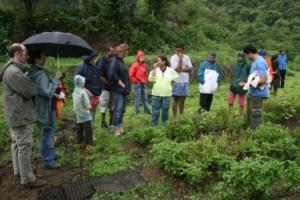In the monsoons, my family and I went to Ashwin Paranjpe’s farm in Nanegaon, located not far from Pune, in the beautiful Kolwan Valley in the Sahyadris. Ashwin is an organic farmer.
He’d invited some of us from Pune city for a visit to understand how and why he and other farmers in the Valley are practicing organic farming. They had also asked if we would help in paddy transplantation.
Ashwin described why he has turned to organic farming. “The Green Revolution, which introduced hybrid seeds, chemical fertilizers, and pesticides to Indian farmers in the late 1960s is credited with making our nation ‘food surplus’. But over the last four decades, most of our farmlands, water resources, and even the food we eat have been severely contaminated by over-use of chemical fertilizers and pesticides. Chemical-based agriculture has also jeopardized the health of unsuspecting consumers. The snow-white cauliflowers, shiny red tomatoes, and the fat brinjals grown with fertilizers and literally drenched in pesticides are nothing but slow poisons…
On the other hand, organic farming believes that crops should be grown by nature’s rules so that our food is bestowed with all its vital life-force and not just with chemical elements.”
As he took us for a walk around the farm, Ashwin pointed out what grows on his farm. In the rains it is mainly the cucurbits (bitter gourd, sponge gourd, snake gourd, pumkin, etc.) which grow very well, plus gawar (cluster bean), bhendi (okra), brinjal, cherry tomatoes, and tuber crops such as carrots, radish, and beetroot.

Cereals such as finger millet (ragi), warai, and about four varieties of rice are also grown during monsoon.
The winter season produces cabbage, cauliflower, broccoli, green leafy vegetables, lettuce, celery, potatoes, and wheat. The summer season is good for peanuts, onions, chillies, and other vegetables.
All farmers in Ashwin’s group practice ‘mixed’ cropping, where plants belonging to different botanical families are carefully selected and ‘mixed’ so that there are at least 8 to 10 different vegetables growing in any particular farm plot at any time of the year. Knowledge of ‘companion crops’ is also useful; for example, onions grow well with tomatoes, corn grows well with beans, etc. Simple techniques such as planting a few rows of marigold in the vegetable plots, or planting mustard (belonging to the same family as the cole crops) which flowers earlier and diverts the attention of the pests from the economic crop, are useful tools for the organic farmer.
Knowing that Ashwin studied a regular agriculture course in Pune and also that he has not grown up as a farmer, I wonder where he learnt organic farming.

Ashwin replies, “I learnt organic farming when I farmed on a small plot of barren land using nothing but hand-implements and horse dung for manure. Although most of my academic training had been in ‘hi-tech’ farming such as hydroponics and greenhouses, the moment I started farming on my own, I realized that the time-tested ways of our ancestors were far superior since they worked ‘with’ nature and not ‘inspite’ of it.
I owe my knowledge of organic farming to a group of young Catalan farmers in north-eastern Spain where I volunteered on the weekends. Although I couldn’t speak much Spanish at that moment, what I could learn by ‘observing’ and doing I could never have learnt by reading books or listening to lectures. For being able to do anything well, one needs to understand the ‘logic’ of how things work. Understanding the logic of agriculture is probably what distinguishes the academicians from the true practitioners of organic farming. I learnt the logic part of agriculture from Dr. Dan Cantliffe, who was my guide and professor at the University of Florida. There is another ingredient which one needs for ‘persisting’ with what one does… that ingredient is “passion”. Dr. Rosie Koenig (who runs a beautiful organic farm in Florida and who’s pioneered the Community Supported Agriculture – CSA movement in USA) was the person who instilled in me the passion for organic farming.”
Curious about how farmers today are supposed to unlearn chemical farming and explore next-gen organic farming, I ask Ashwin if organic farming today is a return to pre-chemical farming. Or is there new knowledge that he and other farmers are creating in response to the present day context and demands made on agriculture.
Ashwin says, to a large extent, yes, organic farming today is a ‘return’ to pre-chemical farming. However, organic farming today is even more challenging than it was 60 – 70 years ago, because the resources available with the farmer (soil, water, local seeds, cattle manure, and human labour) are either in short supply or their quality has depleted beyond redemption. Thus, contemporary organic farming not only needs to RETURN to pre-chemical/ traditional ways of farming, but also ADAPT to today’s realities such as population growth, elevated cost of living, season-neutral attitude of the market, dominance of mechanized/ large-scale farming, globalization, and even climate change!
Consumer Network
Ashwin and twelve other farmers in the Valley have formed a group of producers. Since Ashwin lives in the city, he has been able to form a network of consumers. The Organic Farmers & Consumers Alliance (OFCA) model hopes to bring about a major attitudinal change in the Indian agriculture sector since its looks at farming not merely as a ‘way of life’, but a commercial and profitable enterprise.
The OFCA initiative aims to introduce ‘precision’ and ‘market-sensitive’ organic farming to small-farmers (especially young farmers), and help them to market their products ‘directly’ at a price that is not only affordable to urban consumers but also profitable to the farmers. The OFCA organic farming model is based on 1500m2 of net crop area plus about 500m2 of area devoted to fodder crops, animal husbandry, family housing, and storage.
A local NGO (in this case Gomukh Trust) brings small farmers together to do planned, market-oriented organic farming. After studying the market demand for organic farm produce, all organic farmers in the group and the NGO sit together and make a crop plan at the beginning of each season. The crop plan takes into account the demand for each farm product, as well as the land, water, labour, cattle, and other resources available with each farmer. Farmers receive Rs. 20 per kilo for all vegetables throughout the year, and the consumer pays Rs. 32 for all Indian vegetables throughout the year. Marginal surpluses are processed by local farmers without using chemical preservatives and using appropriate technology, and sold at competitive prices.
Within two years, a small farmer in Kolwan valley can treble what they might earn from sugarcane (Rs 16,660) by growing organic vegetables (Rs. 50,000) per 2000m2 of land, by following the OFCA model.
Certification
When an external agency certifies organic products, the cost burden is often shifted to the consumer. OFCA organic produce is not certified by any external agency. The farmers in the OFCA follow a locally appropriate Participatory Guarantee System of ‘peer certification’ where farmers themselves audit the farms of their peers. This not only reduces the overall cost of organic farming, but also helps to maintain integrity within the group.
More information and Ashwin’s contact details are at the Gorus Centre for Rural Sustainability webpages
……..
Since it hasn’t rained enough, the fields are not flooded, and conditions are not right for paddy transplantation. This is disappointing, but we city-folks have learnt and gained so much by our visit here, that we hope to come back another weekend. We do buy our organic vegetables from the OFCA, but did not realize all the thinking that has gone behind the development of this initiative in Kolwan Valley.
The morning walkabout is done; a delicious organic lunch has been organized. Vijay strums a guitar as we watch the rain and reflect on what’s important in our lives.

Thanks, Sanskriti, for lucidly packing so much information into such a short write-up, and for making a complex subject so deceptively simple.
After this memorable trip, our family has gone organic. We source our vegetables, rice, mustard and the delicious karli pickle from GORUS. Very nice initiative, very nice veggies and very convenient service of home delivery.
Great show Ashwin!
Thanks Sansy for a lovely write up!
We really missed the paddy replanting. we’ll wait for the next year and pray it rains well.
Organic farming methods offer several benefits for the environment and human health as a whole, but unfortunately, there are many misconceptions and falsehoods being spread regarding organic food and farming methods, both by proponents and detractors. Here are the facts about what organic methods can do for us and what they can’t.
http://www.selfdestructivebastards.com/2009/11/organic-myths-and-realities.html
Nice post Sanskriti! look forward to meeting Ashwin sometime.
Hello,
Please could you give me the directions to Ashwin’s farm. Also, please could you help me with his contact details.
Hi Mariyam
You can see more details and contact info at http://www.gomukh.org/contact_us.html
Gomukh Environmental Trust for Sustainalbe Development
‘Durga’ 92/2 Gangote Path,
Opp. Kamala Nehru Park,
Erandavane, Pune 411 004, (India)
Tel/Fax : +91 20 25651434, 25673324, 25660160
Email : gomukh@vsnl.com
Website : http://www.gomukh.org
i wud like2visit ur farm.plz give me a ring on my cell#9371922710asap
plz cal me on9371922710
we are in the retail Store of f & v in hyper formate like to push organic Fruits and veg to our valuable customer pls guide
You may contact Mr Ashwin Paranjpe directly at:
“Durga” 92/2, Gangote Path, Erandwane,
Pune 411 004, Maharashtra, India.
Email: gorus.india@gmail.com
Tel: 91-20-25660160 / 25673324
Tele fax: +91 20 25651434
Dear Sanskriti,
thanks for the write up. I wanted to understand the basics of organic farming since such a long time . thnaks 🙂
We are Retail Buisiness sector in F & V Under SPAR Hypermarket International Brand having South & North Location Outlets in Pan India
Loking forward thE Organic F & V Range to our Outlets in Pune & Other Location
Pls cont on …….
0954513144
very nice post sanskriti.THANK U. Iwant to come to u& join too with your OFCA would
U like.I am growing aswgandha in 5acre on O.Land.&searching for customer pl.. help me.
U.K.Shrivastav.
Thanks for giving information about Gomukh & organic forming project of Ashwin Paranjape
very good information about organic product i would likego for the same . kindly send me the derails.
i am doing project on organic food product awareness so can u help me – dr .aparna deshmukh
do you suuply vegetables to new bombay ?
I would like to visit the farm, please send me the details
even i would like to visit the farm and will also visit the office for the details
Hi Vidya, do take a look at http://www.gorus.in/about/
Sanskriti
Hey, excellent read. I too am pursuing organic farming and need to get in touch with Mr. Ashwin for the same L. If I could get any contact number or email address.
Hello and thanks for your interest. You may check the contact details on this website http://www.gorus.in/
We are manufacturer of organic fertilizers. Having range of organic products such as Farm yard manure, Phosphorus rich organic manure, micro rich slurry etc which is made from 3000 cow dung waste. Located at manchar pune.
Contact no- 8600765938
dear concern,
I would to visit and learn about organic faring, how I can reach you?
thanks